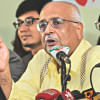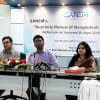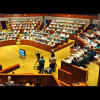Health sector uncared for
Asad Kazi of Bagerhat was advised dialysis for kidney disease. His wife Hawa told doctors that they wanted medicinal treatment as dialysis would cost them Tk 7,000 a month on average.
"I collected Tk 20,000 from my neighbours to come to Dhaka and almost the total amount has been spent. Earlier, I spent all my savings in a cooperative for his treatment. How can I go for dialysis?" said Hawa at Shaheed Suhrawardy Medical College Hospital.
Asad, aged about 55, is a van driver and his wife a domestic help. With their collective income, the couple used to run their six-member family. With Asad suffering from kidney disease, the family is now financially worse off.
"I don't know how I will run the family. What will happen to my schoolgoing children?" she said on Tuesday.
Like Asad, some eight lakh people in Bangladesh are suffering from kidney failure. The patients either need dialysis or kidney transplant -- both expensive treatment options.
Similar is the case for those suffering from chronic diseases like cancer, cardiovascular and respiratory diseases, diabetes and injuries that need long-term treatments. As such treatments are expensive, these leave the poor in financial hardship. According to Bangladesh National Health Accounts 1997-2015, out of pocket (OOP) health expenditure (private spending) in Bangladesh is 67 percent, which is more than double the global average of 32 percent.
A study by the ICDDR,B found that the OOP health expenditure pushes four to five million Bangladeshis like Asad into poverty every year. In his budget speech, Finance Minister AMA Muhith did not mention any specific plan to address the high expenditure issue. He spoke of building new hospitals, medical colleges and recruitment of doctors, nurses and midwives. He proposed allocating Tk 23,383 crore for the health sector, up by Tk 2,704 crore from that of the current fiscal year.
However, compared to the total budget, its share has decreased from current year's 5.39 percent to 5 percent next year.
Out of Tk 23,383 crore, the annual development budget is Tk 9,041 crore and the rest is revenue budget meant for salaries and benefits of public servants.
Dr Rashid E Mahbub, chairman of National Health Rights Movement, said the health budget for the next fiscal year was much lower as the World Health Organisation recommends it to be 15 percent of the total budget.
The question, however, is how the money is going to be utilised. "Will the hospital management be better? Will the private sector be better regulated?" Rashid said.
"Will the hospital management be better? Will the private sector be better regulated?" Rashid said. He said the government proposed reducing import duty on raw materials for some medicines, but the people won't be benefitted from this measure unless the price of medicine is regulated.
"With the cost of all healthcare services growing, it is very likely that the out of pocket health expenditure would go up," said Rashid. Mahbub Elahi Chowdhury, acting head of Universal Health Coverage Programme at the ICDDR,B, said Bangladesh has a good healthcare infrastructure up to the village level. There are also a good number of doctors, he said.
"However, human resource management remains a major problem. Many doctors posted at the rural areas remain absent. Also, many at the public hospitals don't work full-time. It is a question of accountability," he told this correspondent. Even if the government has the drugs and logistics, the healthcare services cannot be reached to the people if health personnel do not play their due role, said Mahbub.
The government has been talking about health insurance for all for long, and a pilot scheme is running in three upazilas of Tangail for around three years. However, the authorities concerned are still struggling to prove it as a model, he added.
"Improving governance is key to providing quality and affordable healthcare to people.".

 For all latest news, follow The Daily Star's Google News channel.
For all latest news, follow The Daily Star's Google News channel. 







Comments